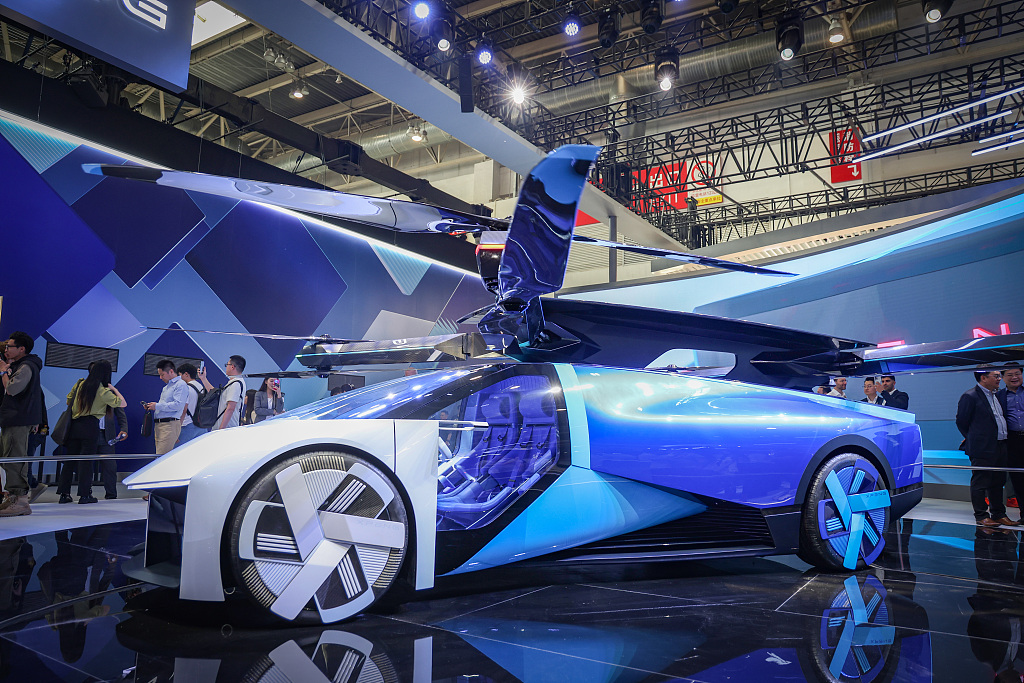
People visit XPENG’s booth at 2024 Beijing International Automotive Exhibition on April 25. [Photo/VCG]
BEIJING – Walking around the vast exhibition halls of the China International Exhibition Center in northeastern Beijing’s Shunyi district is an overwhelming experience: there are just so many dazzling cars that it’s hard for one’s eyes to take them all in.
The suburban area is hosting the 10-day-long 2024 Beijing International Automotive Exhibition (Auto China 2024), a grand auto industry event that kicked off Thursday after a lapse of four years.
It’s my first time to attend an auto exhibition, and I was amazed by the intensity of green and smart technologies as well as the passion of visitors, especially the heavy attendance of foreigners.
New energy vehicles (NEVs) unsurprisingly dominated the auto show with 278 NEVs going on display. While many automakers seek to make their cars more stylish and comfortable, some market players are investing big to make the vehicle smarter by leveraging the power of large models.
XPENG Motors, a leading smart NEV maker based in Guangzhou, showcased a string of AI-powered innovations at the event, including XPlanner, a neural network-based planning and control large model to enable more human-like learning, thinking and actions.
The company also unveiled XOS 5.1.0, or Tianji OS, a pioneering operating system to comprehensively integrate AI technology into smart cockpit and smart driving.
A recent report from global market research firm International Data Corporation predicted that the global sales of smart driving cars will maintain rapid growth, and the development of smart driving empowered by AI investment and the expansion of unmanned driving application scenarios are important market trends in the future.
“The next decade will be a ‘golden decade’ of smart vehicles. The core of smart vehicle advances is how to operate with automotive software adoption emerging as the new industry norm,” said XPENG chairman and CEO He Xiaopeng.
The company’s exhibits also offer a glimpse into the future of mobility. A model of intelligent electric flying car from XPENG AeroHT has become one of the most eye-catching vehicles at the show, drawing groups of visitors to take photos or livestream.
“I cannot think of another word than ‘amazing’ to describe the vehicle,” a British visitor made the remarks while shooting a video blog.
Next to XPENG’s exhibition area is that of global auto giant Volkswagen Group. Their proximity in the exhibition hall echoes well with the growing partnership between established foreign auto firms and Chinese counterparts to boost competitiveness in the world’s largest auto market and beyond.
Just two weeks ahead of the Auto China 2024, the Germany carmaker announced plans to expand its production and innovation hub in Hefei, capital of East China’s Anhui province, with investments totaling 2.5 billion euros ($2.68 billion).
In mid-April, the two companies, which inked a stake-holding agreement last year, signed a strategic cooperation framework agreement on the electronic and electrical architecture, which is expected to equip Volkswagen brand of electric vehicles produced in China from 2026.
Thomas Schafer, CEO of the Volkswagen brand, highlighted at a press conference during the auto show that local technical development with strong partners in China will accelerate the pace of innovation as a major pillar of the company’s China strategy.
“We are ushering in a new era of mobility in China, together with our Chinese partners,” Schafer said.
